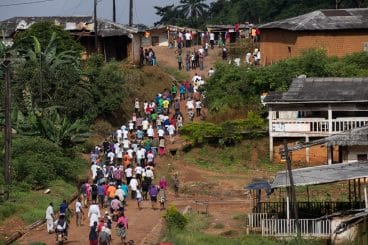
Jan 31, 2018 | Focolare Worldwide
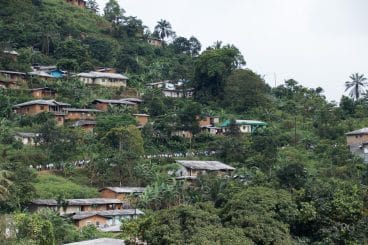 Cameroon, in the equatorial region of West Africa, is composed of two groups of regions that speak French and English respectively. The differences between them are not limited to language, but also some aspects of public administration. An escalation of violence is threatening the country of 23 million people livining within a territory of 475 thousand square kilometers. Raphaël Takougang, a Cameroonian lawyer and member of the Focolare, who now lives in Italy, explains: “The francophone part became independent on January 1, 1960. For the English-speaking part there was a referendum on October 1, 1961 to decide whether or not to join neighbouring Nigeria, which was already Anglophone, or stay with Cameroon. The northern part of this region chose to join Nigeria, the south preferred to stay with Cameroon. Thus was born a Federal Republic with two states, East Cameroon and South Cameroon, each with its own institutions – Parliament, government, legal systems – and others at the federal level. On May 20, 1972, another referendum resulted in the United Republic of Cameroon. In 1984, a small change in the Constitution removed the word “united” and, from then on, the country has been called the Republic of Cameroon. Ever since 1972 the malaise has been growing among the Anglophones who are a strong minority in the country, and there is even a name for it: the Anglophone problem.
Cameroon, in the equatorial region of West Africa, is composed of two groups of regions that speak French and English respectively. The differences between them are not limited to language, but also some aspects of public administration. An escalation of violence is threatening the country of 23 million people livining within a territory of 475 thousand square kilometers. Raphaël Takougang, a Cameroonian lawyer and member of the Focolare, who now lives in Italy, explains: “The francophone part became independent on January 1, 1960. For the English-speaking part there was a referendum on October 1, 1961 to decide whether or not to join neighbouring Nigeria, which was already Anglophone, or stay with Cameroon. The northern part of this region chose to join Nigeria, the south preferred to stay with Cameroon. Thus was born a Federal Republic with two states, East Cameroon and South Cameroon, each with its own institutions – Parliament, government, legal systems – and others at the federal level. On May 20, 1972, another referendum resulted in the United Republic of Cameroon. In 1984, a small change in the Constitution removed the word “united” and, from then on, the country has been called the Republic of Cameroon. Ever since 1972 the malaise has been growing among the Anglophones who are a strong minority in the country, and there is even a name for it: the Anglophone problem. 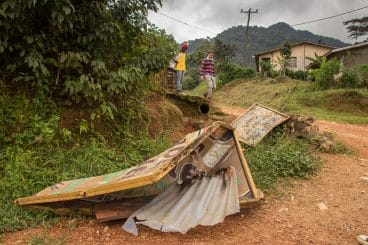 Ever since 2016 the crisis situation in the Anglophone region set off a series of strikes, first against teachers, then against lawyers. The people of the Mariapolis in Fontem, in the very heart of the Cameroon forest, explain: “While on the one hand the bishops had always encouraged dialogue, the boycotting of educational and justice institutions had an unexpected result on the crisis, which worsened with an escalation of strikes also among commercial businesses and transportation systems, in accordance with a strategy known as “Dead City.” No students showed up for the beginning of the last year school year. Despite the threats of reprisals against transgressors, here and there, some schools courageously opened their doors and others followed their example. The OLSW College in Fontem also resumed classes.” The Mariapolis in Fontem was born from the testimony of concrete love of some doctors, who arrived there in 1966, after the local bishop appealed to Chiara Lubich to take care of the Bangwa people, who were suffering from a very high infant mortality rate that was leading to their extinction. In a short time, thanks to the contribution of people from all over the world, Fontem equipped itself with schools, a hospital and other service facilities. Since then, the Bangwa people and several other neighbouring peoples have set out on the path of fraternity, which can be seen now in other citadels that have begun on the African continent. With its 80 thousand citizens, Fontem is a meeting and training place for people from all over Africa and the world. Here they experience how the exchange and collaboration among men and women of different races, cultures and traditions can bear fruits of brotherhood even in regions battered by conflicts.
Ever since 2016 the crisis situation in the Anglophone region set off a series of strikes, first against teachers, then against lawyers. The people of the Mariapolis in Fontem, in the very heart of the Cameroon forest, explain: “While on the one hand the bishops had always encouraged dialogue, the boycotting of educational and justice institutions had an unexpected result on the crisis, which worsened with an escalation of strikes also among commercial businesses and transportation systems, in accordance with a strategy known as “Dead City.” No students showed up for the beginning of the last year school year. Despite the threats of reprisals against transgressors, here and there, some schools courageously opened their doors and others followed their example. The OLSW College in Fontem also resumed classes.” The Mariapolis in Fontem was born from the testimony of concrete love of some doctors, who arrived there in 1966, after the local bishop appealed to Chiara Lubich to take care of the Bangwa people, who were suffering from a very high infant mortality rate that was leading to their extinction. In a short time, thanks to the contribution of people from all over the world, Fontem equipped itself with schools, a hospital and other service facilities. Since then, the Bangwa people and several other neighbouring peoples have set out on the path of fraternity, which can be seen now in other citadels that have begun on the African continent. With its 80 thousand citizens, Fontem is a meeting and training place for people from all over Africa and the world. Here they experience how the exchange and collaboration among men and women of different races, cultures and traditions can bear fruits of brotherhood even in regions battered by conflicts.  “The Catholic college in Fontem suffered an attack,” the locals have reported, “but many people of the village have come to help students and teachers, even at the risk of their own lives. With the approach of the anniversary of the aforementioned referendum, of October 1, which is such an historical date for the Anglophone region of Cameroon, violent demonstrations were feared, and the Focolare community organized prayer groups that included people from other regions of the country and from abroad. There has been no loss of life in Fontem. Every occasion is good for building relationships with the various civil, traditional and ecclesial authorities. We try to help those near to us to go beyond the fears, to create family moments, starting from those closest to us, who are often confused by the many voices and the media. The young people have organized “talent show” evenings and the “Sports for Peace” event to promote a more positive spirit “. “All during this period, even in the midst of difficulties – they conclude – the life of the Focolare community has continued. We hope that this challenge of love for all will enable us to discern and to act for the good of our country “.
“The Catholic college in Fontem suffered an attack,” the locals have reported, “but many people of the village have come to help students and teachers, even at the risk of their own lives. With the approach of the anniversary of the aforementioned referendum, of October 1, which is such an historical date for the Anglophone region of Cameroon, violent demonstrations were feared, and the Focolare community organized prayer groups that included people from other regions of the country and from abroad. There has been no loss of life in Fontem. Every occasion is good for building relationships with the various civil, traditional and ecclesial authorities. We try to help those near to us to go beyond the fears, to create family moments, starting from those closest to us, who are often confused by the many voices and the media. The young people have organized “talent show” evenings and the “Sports for Peace” event to promote a more positive spirit “. “All during this period, even in the midst of difficulties – they conclude – the life of the Focolare community has continued. We hope that this challenge of love for all will enable us to discern and to act for the good of our country “.
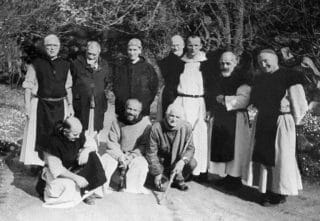
Jan 31, 2018 | Focolare Worldwide
 The Vatican has promulgated the decree attesting to the martyrdom of the 7 monks of Tibhirine, among whom Msgr Pierre Claverie, Bishop of Orano, and the other 11 male and female consecrated religious, killed between 1994 and 1996 during the Algerian civil war which caused the death of thousands of innocent people among which journalists, writers, Imams and common folk. A movie entitled “Of Gods and Men” was made about the 7 Trappist monks who were abducted from their abbey of Our Lady of Atlante (80 km from Algiers) and slain in still obscure circumstances. These vicissitudes reached their peak in August 1996, when the Dominican Bishop of Orano, fervid defender of the reconciliation between Muslims and Christians, was killed together with his Muslim driver, by a bomb at the entrance of his house. The spokesman of the French Bishops’ Conference said “They are martyrs of love because they loved up to the end, giving their lives for their Algerian friends. For us it is a sign that love is not vain and will triumph.” The Algerian bishops commented “Our Church is rejoicing” associating to their homage “the thousands of people who were not afraid to risk their own lives for their fidelity in the faith in God, their country and their conscience.”
The Vatican has promulgated the decree attesting to the martyrdom of the 7 monks of Tibhirine, among whom Msgr Pierre Claverie, Bishop of Orano, and the other 11 male and female consecrated religious, killed between 1994 and 1996 during the Algerian civil war which caused the death of thousands of innocent people among which journalists, writers, Imams and common folk. A movie entitled “Of Gods and Men” was made about the 7 Trappist monks who were abducted from their abbey of Our Lady of Atlante (80 km from Algiers) and slain in still obscure circumstances. These vicissitudes reached their peak in August 1996, when the Dominican Bishop of Orano, fervid defender of the reconciliation between Muslims and Christians, was killed together with his Muslim driver, by a bomb at the entrance of his house. The spokesman of the French Bishops’ Conference said “They are martyrs of love because they loved up to the end, giving their lives for their Algerian friends. For us it is a sign that love is not vain and will triumph.” The Algerian bishops commented “Our Church is rejoicing” associating to their homage “the thousands of people who were not afraid to risk their own lives for their fidelity in the faith in God, their country and their conscience.”
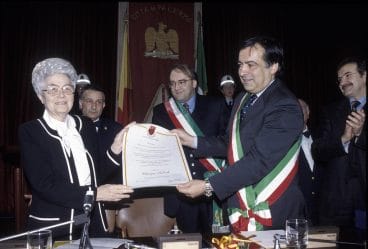
Jan 29, 2018 | Focolare Worldwide
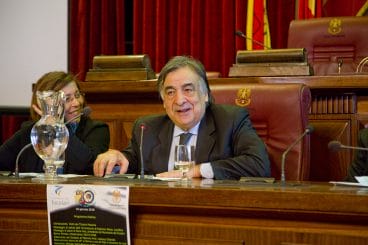 January 1998. Palermo prepared for the Grand Jubilee of the year 2000 attracting to itself the signs of light and shadow. It was a mute city, bloodied by the past and recent massacres of the mafia, but also a city determined to redeem itself and show its true countenance. January 2018. Today, the Sicilian capital appears as a “mosaic city,” an advanced expression of the dialogue between the various European cultures and the Arab world, and an outpost of Middle East culture within the European fabric. In the presence of Mayor Leoluca Orlando and the authorities of some representatives of the institutions, on 20 January the city wanted to “commemorate” – as a “commitment” to proceed in the same direction – an event which was for the city a step in its “magnificent providential design,” according to the words Chiara Lubich expressed then. During the various speeches, some aspects of the life of the Focolare over the last 20 years emerged: the social commitment and in the field of schooling, especially in some outskirt districts like Ballarò, Brancaccio and Zen, the promotion of events and the reflection on some grand themes like ecumenism, commitment toward the new generations with the start-up of schools of civil participation, and the discussion with personalities from the economic, political, cultural and art sectors. In these years the Focolare community has contributed to the journey of the entire city towards the construction of a “city of reception and rights,” with the values of fraternity and the continual pursuit of dialogue.
January 1998. Palermo prepared for the Grand Jubilee of the year 2000 attracting to itself the signs of light and shadow. It was a mute city, bloodied by the past and recent massacres of the mafia, but also a city determined to redeem itself and show its true countenance. January 2018. Today, the Sicilian capital appears as a “mosaic city,” an advanced expression of the dialogue between the various European cultures and the Arab world, and an outpost of Middle East culture within the European fabric. In the presence of Mayor Leoluca Orlando and the authorities of some representatives of the institutions, on 20 January the city wanted to “commemorate” – as a “commitment” to proceed in the same direction – an event which was for the city a step in its “magnificent providential design,” according to the words Chiara Lubich expressed then. During the various speeches, some aspects of the life of the Focolare over the last 20 years emerged: the social commitment and in the field of schooling, especially in some outskirt districts like Ballarò, Brancaccio and Zen, the promotion of events and the reflection on some grand themes like ecumenism, commitment toward the new generations with the start-up of schools of civil participation, and the discussion with personalities from the economic, political, cultural and art sectors. In these years the Focolare community has contributed to the journey of the entire city towards the construction of a “city of reception and rights,” with the values of fraternity and the continual pursuit of dialogue. 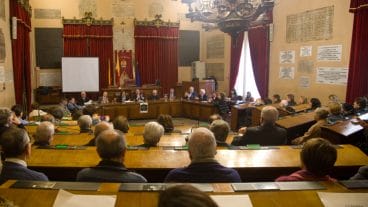 “The memory of the honorary citizenship given to Chiara Lubich,” affirmed Mayor Orlando, “is an occasion to see the city’s progress, in the name of respect for the human being and the construction of a community founded on the values of unity and brotherhood: those on which Chiara had founded her movement and which today brings together millions of people worldwide. Today those values are part of the daily life of Palermo, with reception and solidarity which are the testing grounds, but also an extraordinary occasion to confirm the will of the Palermo people to build a city on a human scale and that welcomes others, as is continually demonstrated in civil society’s undertakings.”
“The memory of the honorary citizenship given to Chiara Lubich,” affirmed Mayor Orlando, “is an occasion to see the city’s progress, in the name of respect for the human being and the construction of a community founded on the values of unity and brotherhood: those on which Chiara had founded her movement and which today brings together millions of people worldwide. Today those values are part of the daily life of Palermo, with reception and solidarity which are the testing grounds, but also an extraordinary occasion to confirm the will of the Palermo people to build a city on a human scale and that welcomes others, as is continually demonstrated in civil society’s undertakings.”  The Archbishop of Palermo, Bishop Corrado Lorefice, encouraged all to continue along this path of fraternity through dialogue at all levels, towards a goal “indicated prophetically by Chiara Lubich: that Palermo may become a city on the hill, to which one can refer for the achievement of God’s design for the community of people.” He added, “the celebration of such an event expresses the deep harmony between the city of Palermo and the values contained in Chiara’s charism: work for the reconstruction of unity of the human family.” Maria Voce, President of the Focolare, encouraged all in a message to “share the many moments of fraternity that have been consolidated all these years to promote acceptance, lawfulness and peace,” with the hope “that the city may increasingly stand out for its active testimony on the various fronts of dialogue, multiplying initiatives and imbuing hope and valorising the talents of all in the perspective of unity.” The adhesion to the “City for fraternity” Association, created by the Municipality of Palermo, further commits its citizens to draw inspiration from universal fraternity in every future decision and action.
The Archbishop of Palermo, Bishop Corrado Lorefice, encouraged all to continue along this path of fraternity through dialogue at all levels, towards a goal “indicated prophetically by Chiara Lubich: that Palermo may become a city on the hill, to which one can refer for the achievement of God’s design for the community of people.” He added, “the celebration of such an event expresses the deep harmony between the city of Palermo and the values contained in Chiara’s charism: work for the reconstruction of unity of the human family.” Maria Voce, President of the Focolare, encouraged all in a message to “share the many moments of fraternity that have been consolidated all these years to promote acceptance, lawfulness and peace,” with the hope “that the city may increasingly stand out for its active testimony on the various fronts of dialogue, multiplying initiatives and imbuing hope and valorising the talents of all in the perspective of unity.” The adhesion to the “City for fraternity” Association, created by the Municipality of Palermo, further commits its citizens to draw inspiration from universal fraternity in every future decision and action.
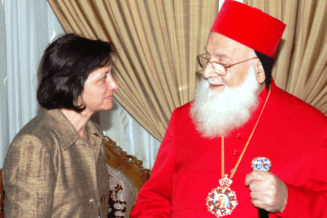
Jan 18, 2018 | Focolare Worldwide
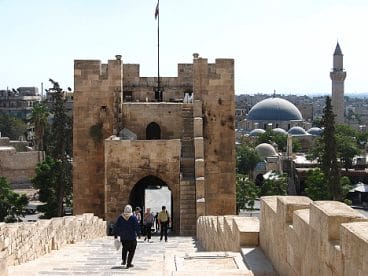 Mirvet Kelly’s grandfather was a deacon: “I remember going with him every Sunday to the Syro-Orthodox Divine Liturgy. I was proud to watch him all dressed in white as he recited his portion of the prayers at the altar.” There are several Christian Churches in Homs, Syria, where Mirvet grew up: Armenian Apostolic, Greek Orthodox and various Catholic Rites, Maronite, Melkite and Syro-Catholic. Before the war, even though we were linked to our own Churches, the faithful attended other Churches without any problem. “As I grew older,” she went on to say, “a lot of things changed: Grandfather died and the Divine Liturgy seemed long and outdated. I was the only Christian at school in the midst a lot of Muslims. At Christmas and Easter I’d be the only one absent and, when I returned, I was bombarded with questions: ‘Why are there so many Churches? Why was your Jesus crucified and rising from the dead on different dates in different Churches? Some friends and I decided to no longer belong to one Church or another, but to be Christians and that’s all. Like many of them, I stopped going to my own Church.” A
Mirvet Kelly’s grandfather was a deacon: “I remember going with him every Sunday to the Syro-Orthodox Divine Liturgy. I was proud to watch him all dressed in white as he recited his portion of the prayers at the altar.” There are several Christian Churches in Homs, Syria, where Mirvet grew up: Armenian Apostolic, Greek Orthodox and various Catholic Rites, Maronite, Melkite and Syro-Catholic. Before the war, even though we were linked to our own Churches, the faithful attended other Churches without any problem. “As I grew older,” she went on to say, “a lot of things changed: Grandfather died and the Divine Liturgy seemed long and outdated. I was the only Christian at school in the midst a lot of Muslims. At Christmas and Easter I’d be the only one absent and, when I returned, I was bombarded with questions: ‘Why are there so many Churches? Why was your Jesus crucified and rising from the dead on different dates in different Churches? Some friends and I decided to no longer belong to one Church or another, but to be Christians and that’s all. Like many of them, I stopped going to my own Church.” A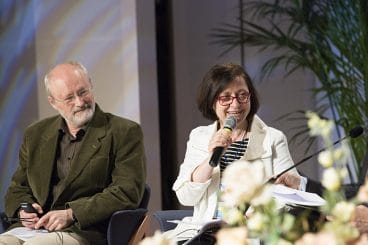 fter a while, Mirvet met a group that was trying to live the Gospel according to the Focolare spirituality. “Through them, I discovered that God is the Father of everyone and that we’re all loved by Him as sons and daughters. My life began to change. Every time I tried to love, going to visit an elderly person or a poor person, for example, my heart would be overcome with peace and joy. One day, I came across a sentence in one of Chiara Lubich’s writings: ‘We should love the other person’s Church as our own.’ Not only did I not love the other person’s Church – I didn’t even love my own Church, which I had criticized and abandoned. At that point, Mirvet’s life, which was already very fruitful both personally and ecumenically, took a new leap. She felt God calling her to give herself entirely to Him. “In the Focolare communities I’ve lived in,” she explained, “I found myself to be the only Orthodox among Catholics of all ages, countries, languages, cultures, Churches and ways of thinking. Trying to live in unity with all the different ideas about things is always a challenge, because each of us has her own tastes and ideas down to the smallest details.
fter a while, Mirvet met a group that was trying to live the Gospel according to the Focolare spirituality. “Through them, I discovered that God is the Father of everyone and that we’re all loved by Him as sons and daughters. My life began to change. Every time I tried to love, going to visit an elderly person or a poor person, for example, my heart would be overcome with peace and joy. One day, I came across a sentence in one of Chiara Lubich’s writings: ‘We should love the other person’s Church as our own.’ Not only did I not love the other person’s Church – I didn’t even love my own Church, which I had criticized and abandoned. At that point, Mirvet’s life, which was already very fruitful both personally and ecumenically, took a new leap. She felt God calling her to give herself entirely to Him. “In the Focolare communities I’ve lived in,” she explained, “I found myself to be the only Orthodox among Catholics of all ages, countries, languages, cultures, Churches and ways of thinking. Trying to live in unity with all the different ideas about things is always a challenge, because each of us has her own tastes and ideas down to the smallest details.  But when we try to appropriate the other person’s reality as our own, we experience that the differences become an enrichment. We often pray for each other’s Churches, in an ongoing growth in the faith and in the relationship with God. And almost without realizing it, we bring the fruit of our communion into our respective Churches, to our jobs and into our daily lives. It seems like a drop in the ocean, but even the tiniest steps united to those of many others in the world, can make a difference. In the countries of the Middle East where I lived, for example, I saw priests helping people, without ever asking what Church they belonged to. They did projects to help out different Churches, to help them meet their needs whether they were Christian – or even Muslim. Last year, Catholics and Orthodox celebrated Easter on the same day. Two Syrian friends who now live in Vienna, Austria, recently reported to me how they and many other Syrians have been helped by a parish priest and some Catholic women focolarini to look for a house, medicine and work. They formed a group in which they live and help each other to share their common Christian experience. In the United States there are more than fifty Syro-Orthodox Christians who meet regularly, once in the Orthodox churches and once in the Catholic churches. They experience that God is always with us and that we have to pray, to live and to love so that Jesus’s testament ‘that all may be one’ is fulfilled as soon as possible.”
But when we try to appropriate the other person’s reality as our own, we experience that the differences become an enrichment. We often pray for each other’s Churches, in an ongoing growth in the faith and in the relationship with God. And almost without realizing it, we bring the fruit of our communion into our respective Churches, to our jobs and into our daily lives. It seems like a drop in the ocean, but even the tiniest steps united to those of many others in the world, can make a difference. In the countries of the Middle East where I lived, for example, I saw priests helping people, without ever asking what Church they belonged to. They did projects to help out different Churches, to help them meet their needs whether they were Christian – or even Muslim. Last year, Catholics and Orthodox celebrated Easter on the same day. Two Syrian friends who now live in Vienna, Austria, recently reported to me how they and many other Syrians have been helped by a parish priest and some Catholic women focolarini to look for a house, medicine and work. They formed a group in which they live and help each other to share their common Christian experience. In the United States there are more than fifty Syro-Orthodox Christians who meet regularly, once in the Orthodox churches and once in the Catholic churches. They experience that God is always with us and that we have to pray, to live and to love so that Jesus’s testament ‘that all may be one’ is fulfilled as soon as possible.”
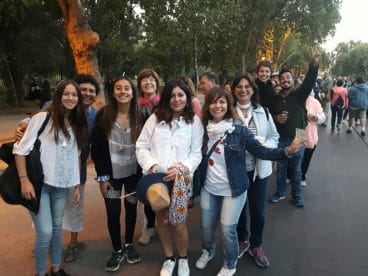
Jan 17, 2018 | Focolare Worldwide
 It is the second day of Pope Francis in “their” land, after he landed in the evening of 15 January at the Airport of Santiago, to start a journey that in two weeks will touch base with two South American countries. “I want to look into your eyes, face to face,” he had said before setting out on his journey. About 15,000 volunteers are at work, offering their talents, time and commitment, to provide a fundamental service in the various events that will be held during the first lap in Chile. “This experience breaks the limits of a task we are entrusted with: in fact, it is the sincere expression of a commitment which will mark our lives forever,” some of them said. “In contrast with the apathy expressed by some of the media, the youths of Chile offer a note of enthusiasm and emotion for the Pope’s arrival,” well expressed by the song composed by Claudio González Carrasco, of the Focolare community in Temuco (southern Chile). Welcomed by the outgoing President, Michelle Bachelet, the Pope then proceeded towards the Apostolic Nunciature, where he will stay during this first lap. Among the many fundamental moments of the journey in Chile, will be the meeting with Chilean mapuches populations, who are battling to safeguard their own identity, and the Mass of 17 January for the indigenous populations of the region.
It is the second day of Pope Francis in “their” land, after he landed in the evening of 15 January at the Airport of Santiago, to start a journey that in two weeks will touch base with two South American countries. “I want to look into your eyes, face to face,” he had said before setting out on his journey. About 15,000 volunteers are at work, offering their talents, time and commitment, to provide a fundamental service in the various events that will be held during the first lap in Chile. “This experience breaks the limits of a task we are entrusted with: in fact, it is the sincere expression of a commitment which will mark our lives forever,” some of them said. “In contrast with the apathy expressed by some of the media, the youths of Chile offer a note of enthusiasm and emotion for the Pope’s arrival,” well expressed by the song composed by Claudio González Carrasco, of the Focolare community in Temuco (southern Chile). Welcomed by the outgoing President, Michelle Bachelet, the Pope then proceeded towards the Apostolic Nunciature, where he will stay during this first lap. Among the many fundamental moments of the journey in Chile, will be the meeting with Chilean mapuches populations, who are battling to safeguard their own identity, and the Mass of 17 January for the indigenous populations of the region.
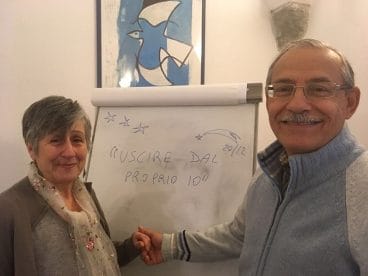
Jan 11, 2018 | Focolare Worldwide
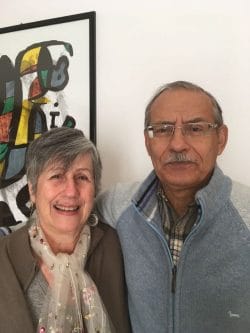 Rosy and Leo Prisco are from Naples, Italy. He’s a railroad worker and she’s an accountant. They’re retired. Their story began 40 years ago at a time when couples who opted for a civil ceremonies were very few. They were agnostics and went to city hall for their wedding. They were so different from each other that no one was betting on their staying together. At the birth of their first child they had a doubt: Should they baptize him or not? They spoke with the parish priest. “For us, adamant Marxists and agnostics, it was unthinkable that a priest should welcome us in such a warm, friendly and open way. Father Salvatore didn’t express a single judgement towards us regarding our situation as a couple, but he became a friend to the point that we were even able to tell him about our constant fighting. Yes, because it was easy to be a revolutionary when we were outside the house, inside the house I was the one doing all the cooking and cleaning. I remember how – to get Leo to listen to me (I was a bit crazy, but at least it worked sometimes!) – I’d do what we did when we held protests on the town square: I’d hang signs on the kitchen walls that said: ‘You’re a tyrant,’ ‘You’re treading on the equality of women,’ and so on. Father Salvatore introduced us to other couples. They were also having problems but had learned to dialogue, and they also had a secret: apologizing and beginning again. We began doing the same, which helped to improve our relationship one day at a time. Meanwhile, Father Salvatore agreed to celebrate Francesco’s baptism and, six years later, the baptism of Nunzio.” “Thanks to Father Salvatore and the other families,” Leo explains, “we had an encounter with God and with God’s love and, little by little, the desire grew in us to be children in accordance with God’s heart.” We came to realize that even though we had turned our backs on him, He never stopped speaking to us, because He is Love. Just as He had in 1993, inside a mortuary room at a hospital. There, by chance, we had come across the pain of two parents whose little angel, a boy of three years, had died. That was a powerful message to us. What if that happened to us? They were the same parents that we met again at a Focolare meeting, invited by Father Salvatore. Yet, from that pain of theirs three family homes were opened for children in difficulty.”
Rosy and Leo Prisco are from Naples, Italy. He’s a railroad worker and she’s an accountant. They’re retired. Their story began 40 years ago at a time when couples who opted for a civil ceremonies were very few. They were agnostics and went to city hall for their wedding. They were so different from each other that no one was betting on their staying together. At the birth of their first child they had a doubt: Should they baptize him or not? They spoke with the parish priest. “For us, adamant Marxists and agnostics, it was unthinkable that a priest should welcome us in such a warm, friendly and open way. Father Salvatore didn’t express a single judgement towards us regarding our situation as a couple, but he became a friend to the point that we were even able to tell him about our constant fighting. Yes, because it was easy to be a revolutionary when we were outside the house, inside the house I was the one doing all the cooking and cleaning. I remember how – to get Leo to listen to me (I was a bit crazy, but at least it worked sometimes!) – I’d do what we did when we held protests on the town square: I’d hang signs on the kitchen walls that said: ‘You’re a tyrant,’ ‘You’re treading on the equality of women,’ and so on. Father Salvatore introduced us to other couples. They were also having problems but had learned to dialogue, and they also had a secret: apologizing and beginning again. We began doing the same, which helped to improve our relationship one day at a time. Meanwhile, Father Salvatore agreed to celebrate Francesco’s baptism and, six years later, the baptism of Nunzio.” “Thanks to Father Salvatore and the other families,” Leo explains, “we had an encounter with God and with God’s love and, little by little, the desire grew in us to be children in accordance with God’s heart.” We came to realize that even though we had turned our backs on him, He never stopped speaking to us, because He is Love. Just as He had in 1993, inside a mortuary room at a hospital. There, by chance, we had come across the pain of two parents whose little angel, a boy of three years, had died. That was a powerful message to us. What if that happened to us? They were the same parents that we met again at a Focolare meeting, invited by Father Salvatore. Yet, from that pain of theirs three family homes were opened for children in difficulty.”  For Rosy and Leo, who in 1995 said their yes in the Sacrament of Marriage, finding Gino and Elisa within the context of the Focolare appeared to be no small coincidence. “Right away a bond was established,” Rosy recounts, “which led us to offer our full-time help as foster parents in a home for families who came to stay at Casa Sorriso for longer or shorter time periods, depending on their family situations.” “This experience,” Leo confides, “gave us an awareness of being merely instruments in God’s hands, and being able to be of help wasn’t a matter of having any special gifts. Today, as then, we’re not the perfect family. We just want to place ourselves at the service of Jesus in the people we meet. Like those little Russian children that we took into our home: a relationship that continues until today now that they’re adults.” In the beginning of 2017, already retired, they wanted to celebrate the 50th anniversary of the New Families Movement by being actively involved in some of the celebratory events. They also took part in a meal for young people. The year came to an end, but not their determination to give more. Last October they moved to Loppiano, planning to stay until July and be able to follow things more closely: practical things like transportation for the families that go there from around the world.
For Rosy and Leo, who in 1995 said their yes in the Sacrament of Marriage, finding Gino and Elisa within the context of the Focolare appeared to be no small coincidence. “Right away a bond was established,” Rosy recounts, “which led us to offer our full-time help as foster parents in a home for families who came to stay at Casa Sorriso for longer or shorter time periods, depending on their family situations.” “This experience,” Leo confides, “gave us an awareness of being merely instruments in God’s hands, and being able to be of help wasn’t a matter of having any special gifts. Today, as then, we’re not the perfect family. We just want to place ourselves at the service of Jesus in the people we meet. Like those little Russian children that we took into our home: a relationship that continues until today now that they’re adults.” In the beginning of 2017, already retired, they wanted to celebrate the 50th anniversary of the New Families Movement by being actively involved in some of the celebratory events. They also took part in a meal for young people. The year came to an end, but not their determination to give more. Last October they moved to Loppiano, planning to stay until July and be able to follow things more closely: practical things like transportation for the families that go there from around the world.

 Cameroon, in the equatorial region of West Africa, is composed of two groups of regions that speak French and English respectively. The differences between them are not limited to language, but also some aspects of public administration. An escalation of violence is threatening the country of 23 million people livining within a territory of 475 thousand square kilometers. Raphaël Takougang, a Cameroonian lawyer and member of the Focolare, who now lives in Italy, explains: “The francophone part became independent on January 1, 1960. For the English-speaking part there was a referendum on October 1, 1961 to decide whether or not to join neighbouring Nigeria, which was already Anglophone, or stay with Cameroon. The northern part of this region chose to join Nigeria, the south preferred to stay with Cameroon. Thus was born a Federal Republic with two states, East Cameroon and South Cameroon, each with its own institutions – Parliament, government, legal systems – and others at the federal level. On May 20, 1972, another referendum resulted in the United Republic of Cameroon. In 1984, a small change in the Constitution removed the word “united” and, from then on, the country has been called the Republic of Cameroon. Ever since 1972 the malaise has been growing among the Anglophones who are a strong minority in the country, and there is even a name for it: the Anglophone problem.
Cameroon, in the equatorial region of West Africa, is composed of two groups of regions that speak French and English respectively. The differences between them are not limited to language, but also some aspects of public administration. An escalation of violence is threatening the country of 23 million people livining within a territory of 475 thousand square kilometers. Raphaël Takougang, a Cameroonian lawyer and member of the Focolare, who now lives in Italy, explains: “The francophone part became independent on January 1, 1960. For the English-speaking part there was a referendum on October 1, 1961 to decide whether or not to join neighbouring Nigeria, which was already Anglophone, or stay with Cameroon. The northern part of this region chose to join Nigeria, the south preferred to stay with Cameroon. Thus was born a Federal Republic with two states, East Cameroon and South Cameroon, each with its own institutions – Parliament, government, legal systems – and others at the federal level. On May 20, 1972, another referendum resulted in the United Republic of Cameroon. In 1984, a small change in the Constitution removed the word “united” and, from then on, the country has been called the Republic of Cameroon. Ever since 1972 the malaise has been growing among the Anglophones who are a strong minority in the country, and there is even a name for it: the Anglophone problem.  Ever since 2016 the crisis situation in the Anglophone region set off a series of strikes, first against teachers, then against lawyers. The people of the Mariapolis in Fontem, in the very heart of the Cameroon forest, explain: “While on the one hand the bishops had always encouraged dialogue, the boycotting of educational and justice institutions had an unexpected result on the crisis, which worsened with an escalation of strikes also among commercial businesses and transportation systems, in accordance with a strategy known as “Dead City.” No students showed up for the beginning of the last year school year. Despite the threats of reprisals against transgressors, here and there, some schools courageously opened their doors and others followed their example. The OLSW College in Fontem also resumed classes.” The Mariapolis in Fontem was born from the testimony of concrete love of some doctors, who arrived there in 1966, after the local bishop appealed to Chiara Lubich to take care of the Bangwa people, who were suffering from a very high infant mortality rate that was leading to their extinction. In a short time, thanks to the contribution of people from all over the world, Fontem equipped itself with schools, a hospital and other service facilities. Since then, the Bangwa people and several other neighbouring peoples have set out on the path of fraternity, which can be seen now in other citadels that have begun on the African continent. With its 80 thousand citizens, Fontem is a meeting and training place for people from all over Africa and the world. Here they experience how the exchange and collaboration among men and women of different races, cultures and traditions can bear fruits of brotherhood even in regions battered by conflicts.
Ever since 2016 the crisis situation in the Anglophone region set off a series of strikes, first against teachers, then against lawyers. The people of the Mariapolis in Fontem, in the very heart of the Cameroon forest, explain: “While on the one hand the bishops had always encouraged dialogue, the boycotting of educational and justice institutions had an unexpected result on the crisis, which worsened with an escalation of strikes also among commercial businesses and transportation systems, in accordance with a strategy known as “Dead City.” No students showed up for the beginning of the last year school year. Despite the threats of reprisals against transgressors, here and there, some schools courageously opened their doors and others followed their example. The OLSW College in Fontem also resumed classes.” The Mariapolis in Fontem was born from the testimony of concrete love of some doctors, who arrived there in 1966, after the local bishop appealed to Chiara Lubich to take care of the Bangwa people, who were suffering from a very high infant mortality rate that was leading to their extinction. In a short time, thanks to the contribution of people from all over the world, Fontem equipped itself with schools, a hospital and other service facilities. Since then, the Bangwa people and several other neighbouring peoples have set out on the path of fraternity, which can be seen now in other citadels that have begun on the African continent. With its 80 thousand citizens, Fontem is a meeting and training place for people from all over Africa and the world. Here they experience how the exchange and collaboration among men and women of different races, cultures and traditions can bear fruits of brotherhood even in regions battered by conflicts.  “The Catholic college in Fontem suffered an attack,” the locals have reported, “but many people of the village have come to help students and teachers, even at the risk of their own lives. With the approach of the anniversary of the aforementioned referendum, of October 1, which is such an historical date for the Anglophone region of Cameroon, violent demonstrations were feared, and the Focolare community organized prayer groups that included people from other regions of the country and from abroad. There has been no loss of life in Fontem. Every occasion is good for building relationships with the various civil, traditional and ecclesial authorities. We try to help those near to us to go beyond the fears, to create family moments, starting from those closest to us, who are often confused by the many voices and the media. The young people have organized “talent show” evenings and the “Sports for Peace” event to promote a more positive spirit “. “All during this period, even in the midst of difficulties – they conclude – the life of the Focolare community has continued. We hope that this challenge of love for all will enable us to discern and to act for the good of our country “.
“The Catholic college in Fontem suffered an attack,” the locals have reported, “but many people of the village have come to help students and teachers, even at the risk of their own lives. With the approach of the anniversary of the aforementioned referendum, of October 1, which is such an historical date for the Anglophone region of Cameroon, violent demonstrations were feared, and the Focolare community organized prayer groups that included people from other regions of the country and from abroad. There has been no loss of life in Fontem. Every occasion is good for building relationships with the various civil, traditional and ecclesial authorities. We try to help those near to us to go beyond the fears, to create family moments, starting from those closest to us, who are often confused by the many voices and the media. The young people have organized “talent show” evenings and the “Sports for Peace” event to promote a more positive spirit “. “All during this period, even in the midst of difficulties – they conclude – the life of the Focolare community has continued. We hope that this challenge of love for all will enable us to discern and to act for the good of our country “.



 “The memory of the honorary citizenship given to Chiara Lubich,” affirmed Mayor Orlando, “is an occasion to see the city’s progress, in the name of respect for the human being and the construction of a community founded on the values of unity and brotherhood: those on which Chiara had founded her movement and which today brings together millions of people worldwide. Today those values are part of the daily life of Palermo, with reception and solidarity which are the testing grounds, but also an extraordinary occasion to confirm the will of the Palermo people to build a city on a human scale and that welcomes others, as is continually demonstrated in civil society’s undertakings.”
“The memory of the honorary citizenship given to Chiara Lubich,” affirmed Mayor Orlando, “is an occasion to see the city’s progress, in the name of respect for the human being and the construction of a community founded on the values of unity and brotherhood: those on which Chiara had founded her movement and which today brings together millions of people worldwide. Today those values are part of the daily life of Palermo, with reception and solidarity which are the testing grounds, but also an extraordinary occasion to confirm the will of the Palermo people to build a city on a human scale and that welcomes others, as is continually demonstrated in civil society’s undertakings.” 
 Mirvet Kelly’s grandfather was a deacon: “I remember going with him every Sunday to the Syro-Orthodox Divine Liturgy. I was proud to watch him all dressed in white as he recited his portion of the prayers at the altar.” There are several Christian Churches in Homs, Syria, where Mirvet grew up: Armenian Apostolic, Greek Orthodox and various Catholic Rites, Maronite, Melkite and Syro-Catholic. Before the war, even though we were linked to our own Churches, the faithful attended other Churches without any problem. “As I grew older,” she went on to say, “a lot of things changed: Grandfather died and the Divine Liturgy seemed long and outdated. I was the only Christian at school in the midst a lot of Muslims. At Christmas and Easter I’d be the only one absent and, when I returned, I was bombarded with questions: ‘Why are there so many Churches? Why was your Jesus crucified and rising from the dead on different dates in different Churches? Some friends and I decided to no longer belong to one Church or another, but to be Christians and that’s all. Like many of them, I stopped going to my own Church.” A
Mirvet Kelly’s grandfather was a deacon: “I remember going with him every Sunday to the Syro-Orthodox Divine Liturgy. I was proud to watch him all dressed in white as he recited his portion of the prayers at the altar.” There are several Christian Churches in Homs, Syria, where Mirvet grew up: Armenian Apostolic, Greek Orthodox and various Catholic Rites, Maronite, Melkite and Syro-Catholic. Before the war, even though we were linked to our own Churches, the faithful attended other Churches without any problem. “As I grew older,” she went on to say, “a lot of things changed: Grandfather died and the Divine Liturgy seemed long and outdated. I was the only Christian at school in the midst a lot of Muslims. At Christmas and Easter I’d be the only one absent and, when I returned, I was bombarded with questions: ‘Why are there so many Churches? Why was your Jesus crucified and rising from the dead on different dates in different Churches? Some friends and I decided to no longer belong to one Church or another, but to be Christians and that’s all. Like many of them, I stopped going to my own Church.” A


